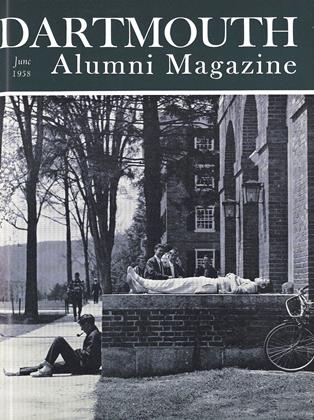AN editorial in TheDartmouth of September 21, 1888, proclaimed: "Dartmouth has cause to rejoice at the small amount of injury done to Rollins Chapel by the late fire." We do not, at our time of life, intend to start questioning the editorial policies of TheD, but we are reminded of some of the more exciting fires on the Hanover scene. An earnest researcher could dig up mounds of data on famous local conflagrations, and the number of feet of 2½, 1½" and booster hose laid each year. There are numerous flaring accounts of the successive destructions of Dartmouth Hall, the burning of South Fayer, of the Tontine Block, the east side of Main Street, the old hotel, and others.
We would deal rather with a few of our own favorite fires - those which we attended either as a member of the now forgotten Undergraduate Fire Squad or as a JV buff, who would pull on pants, slippers, and a D sweater (managerial) and rush to the fray at the sound of the tocsin. By far the best fire of our student days was the Phi Delt house. This was staged on a euphoric mid-afternoon in May - a welcome relief from a losing softball game - and there couldn't have been love-lier carnage. The Fire Squad ordered freshmen to carry scatter rugs and mattresses to the haven of the Sigma Chi house while they occupied themselves with chopping lighting fixtures off the walls of the goat room. Most of the Phi Delts later took temporary refuge in a new apartment house just under the brow of the river hill and, happily enough, that too caught fire at a salubrious moment. It was at 5:30 on a June morning when the serious among us had spent the whole night studying for a final exam in musical appreciation. One entrapped classmate, observing a rescuing ladder approaching his eyrie through smoke and flame, retreated to don silk pajamas and then descend to safety with the smoldering picture of his girl clasped to his breast.
The Inn Stable was a beautiful fire. Its loft was full of hay and its ground floor full of used cars and, with the prevailing winds, the possibilities seemed almost unlimited. As we recall it, we spent that pleasant evening straddling the sharp ridgepole of the Howe Library squirting a garden hose on flying embers and shouting obscenities to similarly occupied Dekes next door.
Probably the most spectacular fire the village has ever witnessed was the burning of the White Church - a lamentable enough event, though we took some malicious satisfaction in telling the sanctimonious that the burning of the Church was God's judgment on the wicked who had claimed that the previous week's burning of the Sphinx House was God's judgment on the wicked.
Of late years, the Hanover Volun-teer Fire Department has achieved an almost professional status. No longer is there need of an Undergraduate Fire Squad to restrain riots and offer gratuitous advice. The storage cisterns that formerly dotted the downtown area have been filled in or forgotten, and we have as an emergency reserve only the pond on the 10th fairway, the river, and the Spaulding Swimming Pool, none of them containing fluorine. Nevertheless, and despite the rising cost of everything from sausage to aspirin, insurance rates in Hanover have dropped from the 25 cents of thirty years ago to about seventeen cents. We have for a long time been happily free from major destruction, though as a precaution the College carries some thirty million dollars insurance on its buildings and their contents. This protects them for almost every hazard except attractive nuisances and inherent vice - there apparently being no coverage available against visiting firemen.
 View Full Issue
View Full Issue
More From This Issue
-
 Feature
FeatureTHE GOALS of a Business Society
June 1958 By ALBERT NICKERSON, -
 Feature
FeatureMUSIC FESTIVAL
June 1958 By GEORGE O'CONNELL -
 Feature
FeatureANTIGONE
June 1958 -
 Feature
FeatureMAY: It's Marvelous
June 1958 -
 Class Notes
Class Notes1918
June 1958 By ERNEST H. EARLEY, RICHARD A. HOLTON -
 Class Notes
Class Notes1910
June 1958 By RUSSELL D. MEREDITH, ANDREW J. SCARLETT, HERB WOLFF '10
BILL McCARTER '19
-
 Article
ArticleThe Hanover Scene
April 1953 By BILL McCARTER '19 -
 Article
ArticleThe Hanover Scene
June 1954 By BILL McCARTER '19 -
 Article
ArticleThe Hanover Scene
February 1956 By BILL McCARTER '19 -
 Article
ArticleThe Hanover Scene
May 1956 By BILL McCARTER '19 -
 Article
ArticleThe Hanover Scene
December 1956 By BILL McCARTER '19 -
 Article
ArticleThe Hanover Scene
February 1958 By BILL McCARTER '19







